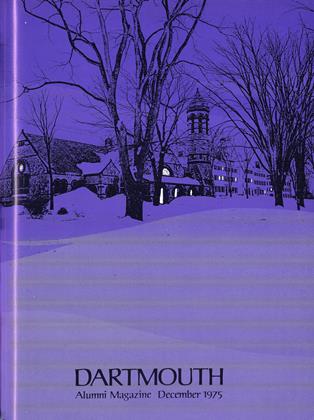If you've been following things closely on college campuses, or if your daughter or son inexplicably brings home grades a lot better than yours were, you probably already know that inflation is not a problem that's plaguing only leaders in Washington. Grade inflation, or the phenomenon of creeping grade point averages, has been in evidence at Dartmouth since the late 1960s, and the word around is that the gentleman who used to squeeze by with a C is nowadays doing so with a B.
College officials have sought to counteract the trend with several changes. In 1973 they replaced the old five-point grade scale with a more conventional four-point scale, which includes pluses and minuses. Reforms in the various plans which come under the loose term "pass-fail" followed.
The latest change, a stiffening of the criteria for academic honors, came this fall after about 60 per cent of the Dartmouth student body was awarded some form of honors last year. A sliding scale of honors will be implemented gradually, the new bench-marks to be based upon the academic achievement of those graduating the preceding academic year.
For the rank of summa cum laude, for example, a student's grade-point average must meet the standard set by the top five per cent of the preceding graduating class. Those achieving grades above ten and 20 per cent of that same standard will be awarded the degree magna cum laude and cum laude, respectively.
 View Full Issue
View Full Issue
More From This Issue
-
 Feature
FeatureQuite Contrary
December 1975 By SAMUEL PICKERING -
 Feature
FeatureThe Assault On Quebec
December 1975 By LEWIS STILWELL -
 Feature
FeatureHigh On Your Dial
December 1975 By DAN NELSON -
 Feature
FeatureDartmouth Radical Union
December 1975 By M.B.R. -
 Class Notes
Class Notes1959
December 1975 By DOUGLAS WISE, BARRY R. BLAKE -
 Class Notes
Class Notes1950
December 1975 By JACQUES HARLOW, EDWARD TUCK II
Article
-
 Article
ArticleREVIVAL
October 1936 -
 Article
ArticleCommunity Development Conference.
APRIL 1966 -
 Article
ArticleAnother DEC Success
FEBRUARY 1968 -
 Article
Article“There is Infinite Freedom Between Each Beat of Music.”
NOVEMBER | DECEMBER 2013 -
 Article
ArticleStanding Together
MARCH 1999 By James Wright -
 Article
ArticleLawrence-Lowell
MARCH 1968 By JOHN S. SULLIVAN '36

